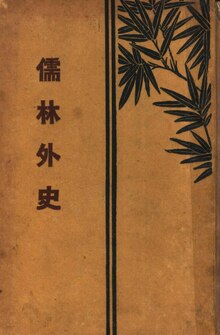
Back Literáti a mandaríni Czech Die inoffizielle Geschichte des Gelehrtenwalds German Chronique indiscrète des mandarins French Írástudók Hungarian Rulin Waishi Italian 儒林外史 Japanese 유림외사 Korean Неофициальная история конфуцианцев Russian Ліс вчених мужів (роман) Ukrainian Nho lâm ngoại sử Vietnamese
 Cover of an early 20th-century edition of The Scholars from the Fudan University | |
| Author | Wu Jingzi |
|---|---|
| Original title | 儒林外史 |
| Language | Written vernacular Chinese |
| Genre | Historical fiction |
| Set in | China, early 16th century AD |
Publication date | 1750 |
| Publication place | Qing China |
| Media type | |
| 895.1348 | |
| LC Class | PL2732.U22 J813 |
| The Scholars | |||||||||||||||
|---|---|---|---|---|---|---|---|---|---|---|---|---|---|---|---|
| Chinese | 儒林外史 | ||||||||||||||
| Literal meaning | An Unorthodox History of a Forest of Confucian Scholars | ||||||||||||||
| |||||||||||||||



The Scholars (Chinese: 儒林外史; pinyin: Rúlín Wàishǐ), also translated as The Unofficial History of the Scholars,[note 1] is a Chinese novel written by Wu Jingzi and published in 1750 during the Qing dynasty. It is considered one of the great "Classic Chinese Novels",[1] and is distinguished for its unusual narrative structure[2] and acerbic wit.
Set in the Ming period, The Scholars describes and often satirizes academic scholars. The first and last chapters portray recluses, but most of the loosely connected plotlines that form the bulk of the novel are didactic stories, on the one hand holding up exemplary Confucian behavior, but on the other ridiculing over-ambitious scholars and the imperial examination system.
Promoting naturalistic attitudes over belief in the supernatural, the author rejects the popular belief in retribution: his bad characters suffer no punishment. The characters in these stories are intellectuals, perhaps based on the author's friends and contemporaries. Although the novel's tone is highly caustic, a major incident in the novel is the main character Du Shaoqing's attempt to renovate his family's ancestral temple, suggesting the author shared with Du a belief in the importance of Confucianism in life in spite of his criticism.
The Scholars was one of the first major novels to popularize a vernacular style now called baihua. Classical phrases (wenyan) appear occasionally, but only in the speech of elite characters. Language reformers in the early 20th century New Culture Movement used the novel to support their view that wenyan was a form of snobbery.[3]
Cite error: There are <ref group=note> tags on this page, but the references will not show without a {{reflist|group=note}} template (see the help page).
- ^ Hsia (1968).
- ^ Cite error: The named reference
Examiningwas invoked but never defined (see the help page). - ^ Shang Wei, "Baihua, Guanhua, Fangyan and the May Fourth Reading of Rulin waishi," Sino-Platonic Papers, I 17 (May, 2002).
© MMXXIII Rich X Search. We shall prevail. All rights reserved. Rich X Search